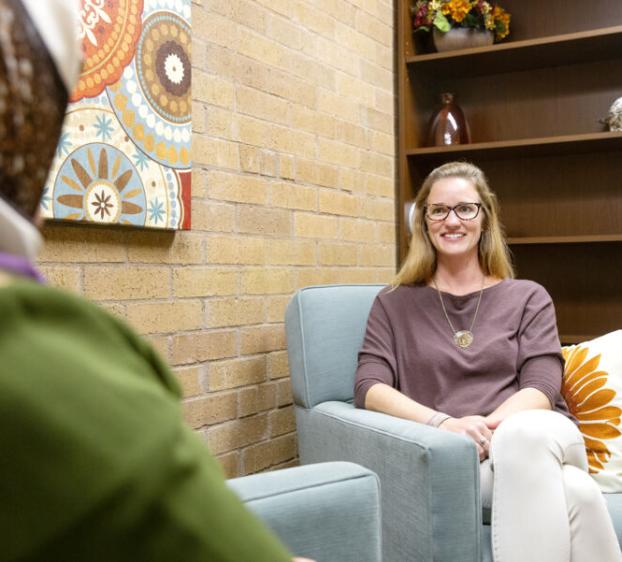Prepare for a Rewarding Profession That Changes Lives
The Master of Arts in Counseling degree prepares students to make a positive social impact by becoming a Licensed Professional Counselor (LPC) or a Licensed Marriage and Family Therapist (LMFT) in Texas.
This 3-year program is designed to serve students with a range of life experiences, reflecting the community they will ultimately serve. You’ll be exposed to a variety of approaches to treating mental health and helping clients and communities across diverse settings.
CACREP Accreditation
Both the Clinical Mental Health Counseling (CMHC) and the Marriage, Couple & Family Counseling (MCFC) concentrations in the program are accredited by the Council for Accreditation of Counseling and Related Educational Programs (CACREP), which is recognized by the Council for Higher Education Accreditation (CHEA) in the United States. Read more about our program in our MA in Counseling Student Handbook.
Why earn your MA in Counseling at St. Edward’s?
St. Edward’s offers small classes and convenient schedules, outstanding faculty, a prime location in Austin and relationships with employers who seek out our graduates. Our impeccable academic standards and personalized approach prepare you to take on a whole new level of success.
Learn from Experts
Our highly accomplished faculty members are all practicing clinicians, consultants and mentors who teach from real-life cases and the latest insights. They’ll get to know you and become trusted advisors during and after your time on the hilltop.
Study a Range of Specialties
Pursue areas of counseling that interest you most — from trauma and crisis management to addiction counseling to group therapy. Explore innovative topics, such as expressive art therapy, grief and loss therapy, and play therapy.
Broaden Your Network
Learn in interactive, discussion-based classes with like-minded colleagues and professors who are well-connected in the field. You’ll be encouraged to network among your classmates and the Austin mental healthcare community.
Apply What You Learn
Practice counseling scenarios with classmates and analyze your sessions in our state-of-the-art Center for Counselor Training. Connect to opportunities for your required practicum and internships through our partnerships in Austin and our on-campus counseling clinic.

On-Campus Counseling Clinic Supports Austin and Counseling Program
The St. Edward’s Community Counseling Clinic offers low-cost counseling for the Austin community and hands-on training with clients for Counseling students. In sessions monitored by faculty via video, students provide general counseling services in person or online and receive feedback on their skills.
What do our graduates do?
The MA in Counseling program offers an educational and training experience that prepares students to work as professional counselors or marriage and family therapists in a variety of settings, including hospitals, residential treatment centers, nonprofit agencies, government, and private practice. A graduate’s career path could include:
- Supporting adults and teens on their journey toward healing and well-being as they navigate challenges like addiction, disordered eating and mood disorders
- Guiding couples and families in fostering deeper mutual understanding and building healthier dynamics
- School-based counseling
- Providing counseling and consultation services within a nonprofit organization
- Developing his or her own private practice
Alumni of the MA in Counseling program at St. Edward’s are furthering their careers at a range of organizations and through their private practices. Here’s a sample:
- Integral Care
- Rock Springs Hospital
- Williamson County Juvenile Justice Center
- Austin Oaks Hospital
- Travis County Detention Center
- Bluebonnet Trails
- Private Practice, Self-Employed
Explore Details About the Master of Arts in Counseling
The Master of Arts in Counseling degree prepares students to become professional counselors with a strong ethical foundation and social justice orientation. Program Director Melissa Alvarado explains how this St. Edward’s program gives students an edge as they enter a strong and vibrant alumni community of MA in Counseling graduates. Check out this helpful Q&A with Alvarado.
Learning Goals
Upon completion of the MA in Counseling program, graduates will be able to demonstrate the following:
- Knowledge and skills associated with professional orientation and ethics in counseling.
- Knowledge of social and cultural diversity understanding through theories of multicultural counseling and the promotion of diversity among different communities and mental health settings.
- Knowledge of systemic and environmental factors that affect human development, functioning and behavior.
- Counseling skills and dispositions necessary to establish therapeutic relationships with clients.
- Knowledge of various theories and models of counseling and begin to formulate their own theoretical orientation.
- Knowledge of group counseling processes and competency in preparing and facilitating group counseling
- Understanding of career development, including theories, assessments, career resources, and the interrelationship between career and other life roles.
- Gaining and applying knowledge in the use of assessment in counseling.
- Understanding and applying quantitative and qualitative research methods as well as program evaluation to inform evidence-based practice.
- Knowledge necessary to address a wide variety of circumstances within the context of clinical mental health counseling (CMHC).
- Development of treatment plans, clinical documentation and conceptualization skills (CMHC).
- Knowledge necessary to address a wide variety of circumstances within the context of marriage, couple and family counseling (MCFC).
- Development of treatment plans, clinical documentation and conceptualization skills within the context of marriage, couple and family counseling (MCFC).
- Appropriate counseling dispositions and behaviors expected of professional counselors.
- Academic requirements to apply for a provisional license from the Texas State Board of Licensed Professional Counselors, the Texas State Board of Licensed Marriage and Family Therapists, or both.
Students who meet the above requirements will receive a Master of Arts in Counseling degree from St. Edward’s.
Career Outcomes
The MA in Counseling prepares students to become professional counselors or marriage and family therapists. Graduates of the program may choose to focus on working with children, adolescents, adults, families and/or couples, with the primary goal of helping clients address personal, social, educational or career challenges and improve their overall wellbeing.
To become a Licensed Professional Counselor (LPC), graduates must:
- Pass the National Counselor Exam (NCE) to fulfill the Texas state board requirement to become Licensed Professional Counselors and
- Complete 3,000 hours of supervised field experience with a temporary license (LPC Associate) under a board-approved supervisor (LPC-S)
Our master’s in Counseling program has a 95% passing rate for the National Counselor Exam (NCE).
To become a Licensed Marriage and Family Therapist (LMFT), graduates must:
- Pass the state AMFRTB examination to fulfill the Texas state board requirement and
- Complete 3,000 hours of postgraduate supervised field experience with a temporary license (LMFT Associate) and a board-approved LMFT supervisor (LMFT-S)
The following documents represent an assessment of student learning within the Master of Arts in Counseling (MAC) program:
The professional counseling programs at St. Edward’s University educate, train and prepare highly skilled, ethical, compassionate mental health professionals grounded in humanistic values that focus on prevention, wellness, personal growth, and a commitment to respecting and promoting human dignity.
Our programs emphasize the client-counselor relationship, and creative and experiential modalities Our curriculum reflects multiple and varied theoretical perspectives with guidance to support students in developing their own framework for community and clinical practice.
Our programs create a transformative environment that allows students to enter their field with an understanding of their own social locations and the role of power, privilege, and difference within institutional, social, intimate, and therapeutic relationships.
St. Edward’s University has a commitment to social justice, which is embodied and embraced across the curriculum in content such as counseling with diverse populations, pro-social autonomy across the lifespan, and community/professional advocacy for the populations we serve. These ideals and many more are fostered within a dynamic, multi-modal learning setting in which critical thinking and the creation and integration of knowledge and experience are celebrated.
The Master of Arts in Counseling program at St. Edward’s takes pride in creating lifelong learners.
The Master of Arts in Counseling is typically completed in about two and a half to three years. Students can elect to take classes part-time or full-time. Most students complete the program in eight semesters and attend year-round (fall, spring, summer). For more information, review the suggested Course Sequencing Guide included below with each concentration.
Face-to-face classes meet once per week each week of the semester. Blended classes are typically taught at a ratio of 70% face-to-face with the remaining instruction online.
For detailed degree requirements, please view and download the Graduate Bulletin PDF or request more information.
Experiential Training
During the last three semesters of the program, students complete field experience hours at the St. Edward’s Community Counseling Clinic and field sites in the Austin area. At the end of the program, students will accrue at least 700 total practice hours. Experiential courses include the Counseling Practicum and two internships.
| Clinical Mental Health Concentration | Marriage, Couple and Family Counseling Concentration |
|---|---|
Clinical Mental Health Core Courses
| Marriage, Couple and Family Counseling Core Courses
|
Clinical Mental Health Concentration Courses
| Marriage, Couple and Family Counseling Concentration Courses
|
Experiential Courses*
*Must be taken consecutively during the last three semesters | Experiential Courses*
*Must be taken consecutively during the last three semesters |
Total: 60 Credit Hours For suggested course sequencing, please review the CMHC Course Sequencing Guide. | Total: 60 Credit Hours For suggested course sequencing, please review the MCFC Course Sequencing Guide. |
Our highly accomplished faculty in the MA in Counseling program are working mental health professionals with extensive expertise and research in the field. They are outstanding thought leaders, teachers and mentors who take pride in getting to know you, helping you achieve your goals and celebrating your successes.
View a list of our faculty members and their contact information on the Department of Counseling webpage.
At $1,610 per credit hour, our 60-hour, Master of Arts in Counseling degree is a smart investment. The skills acquired in this program position you for a career as a Licensed Professional Counselor (LPC) or a Licensed Marriage and Family Therapist (LMFT) in Texas. Tuition* includes all course fees but does not include books, comprehensive fees or other course materials. Once accepted to the program, you are required to submit a $500 non-refundable tuition deposit. Deposits are applied toward tuition and secure your place in the upcoming class.
*Tuition is subject to change at the discretion of the St. Edward’s University Board of Trustees.
Financial Aid
The St. Edward’s University Financial Aid Office provides information about financial aid opportunities available to graduate students. Call us at 512-387-3110 if you are interested in additional details.
To apply for the Master of Arts in Counseling program, students are required to have a bachelor’s degree from an accredited university. Review a complete checklist, including application steps, requirements for the program and key dates.
Graduate students with F-1 visas are eligible for the MA in Counseling program.
Need more information? Please contact an Enrollment Counselor at 512-326-7333.
